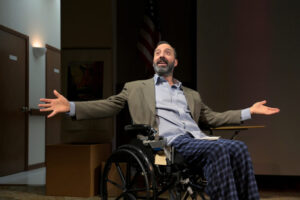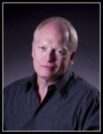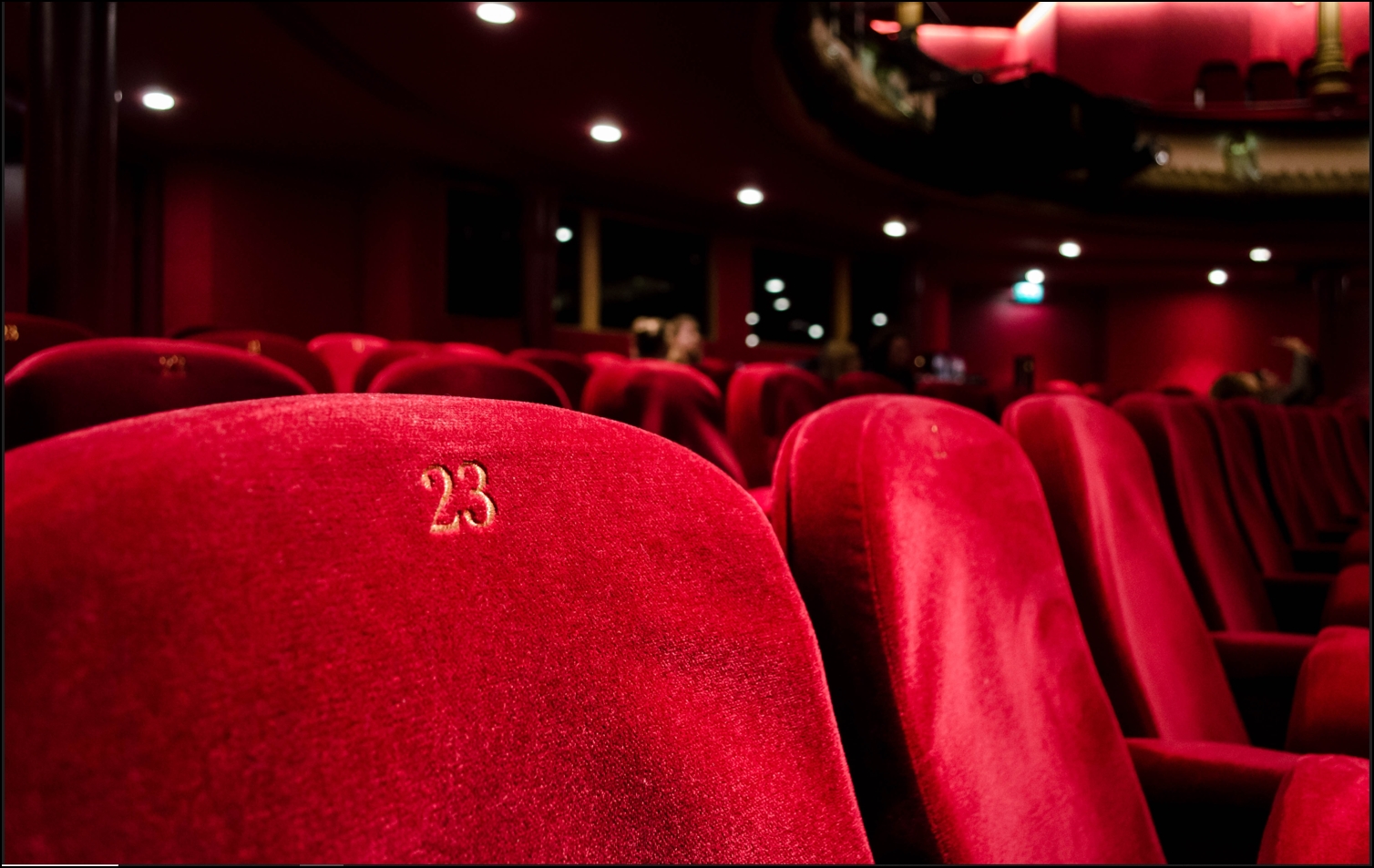
A dying man lectures the audience on the wonders of life in Will Eno’s “Wakey, Wakey” at the American Conservatory Theater, through February 16.
Former TV star Tony Hale (“Arrested Development,” “Veep”) and veteran actress Kathryn Smith-McGlynn bring nuance and conviction to a muddled script directed by Anne Kauffman, its title not a reference to “woke culture” but apparently an admonition to be alert and conscious and rejoice in all that life has to offer including its inherent contradictions and dead-ends.
The piece opens with Hale’s character Guy lying half-clad on the stage and proceeds to having him engage in an addled monologue in his pajamas while sitting in a wheelchair. Some of his ramblings are absurd observations, a few are poignant remembrances, but most are simply non sequiturs strung end-to-end, all accompanied by old home movies and odd bits of eye candy projected on a huge screen behind him, ostensibly controlled by a small remote with which he continually fumbles. The jumble of letters and misspelled words in the projections is a recurring gambit, perhaps symbolic of the loss of cognition suffered by those nearing the end of their tenure on earth—or perhaps not so symbolic, and simply comedic distractions inserted by the playwright to punch up the entertainment value.
This piece has potential…but need(s) much more development to justify putting on such an esteemed stage as ACT’s.
Such confusion is rampant throughout the 80 minutes of “Wakey, Wakey,” a piece of so-called “metatheater” that attempts to confound many of the traditions of live theater. Eno is a trendy playwright whose “The Realistic Joneses” has been performed by many companies and has been generally well-received. His “Middletown” is a pointless exercise in attempting to update Thorton Wilder’s classic “Our Town.” “Wakey, Wakey” continues the pointlessness, right up to and including the moment when Guy expires, launching a deluge of bright balloons and celebratory music.
Eno may have drawn inspiration from Randy Pausch, the Carnegie Mellon University computer scientist who, while dying of pancreatic cancer, delivered motivational talks about achieving childhood dreams. The script’s amateur construction aside, Hale does a marvelous job holding the attention of the audience and conveying his character’s constantly mutating state of energy and awareness.
Smith-McGlynn is tremendously confident and sensitive as hospice nurse Lisa, who comes in late to check on him. She also appears as a community college substitute teacher in the opening sketch “The Substitution,” in which Eno conflates a cultural history lesson with driver’s education. This short piece has potential, as does “Wakey, Wakey,” but both of them need much more development to justify putting them on such an esteemed stage as ACT’s.
 ASR Executive Editor Barry Willis is a member of the American Theatre Critics Association and president of the SF Bay Area Theatre Critics Circle. Contact: barry.m.willis@gmail.com
ASR Executive Editor Barry Willis is a member of the American Theatre Critics Association and president of the SF Bay Area Theatre Critics Circle. Contact: barry.m.willis@gmail.com
| Production | Wakey, Wakey |
|---|---|
| Written by | WIll Eno |
| Directed by | Anne Kauffman |
| Producing Company | American Conservatory Theater (ACT) |
| Production Dates | Through Feb 16th |
| Production Address | American Conservatory Theater, Geary Theater 415 Geary Street San Francisco, CA 94102 |
| Website | www.act-sf.org |
| Telephone | (415) 749-2228 |
| Tickets | $15 – $110 |
| Reviewer Score | Max in each category is 5/5 |
| Overall | 3/5 |
| Performance | 4/5 |
| Script | 2/5 |
| Stagecraft | 3/5 |
| Aisle Seat Review PICK? | ---- |
